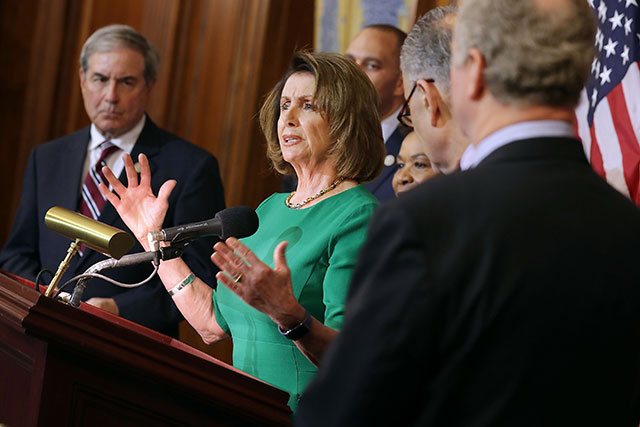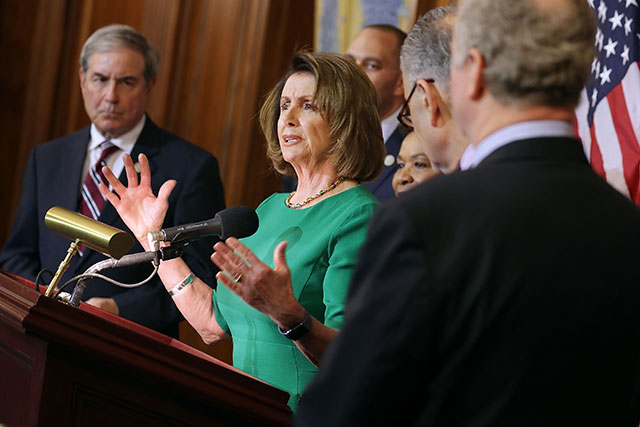
Did you know that Truthout is a nonprofit and independently funded by readers like you? If you value what we do, please support our work with a donation.
 House Minority Leader Nancy Pelosi is joined by House Budget Committee ranking member John Yarmuth and fellow Democrats from the House and Senate during a news conference in the Rayburn Room at the US Capitol, April 28, 2017, in Washington, DC. (Photo: Chip Somodevilla / Getty Images)
House Minority Leader Nancy Pelosi is joined by House Budget Committee ranking member John Yarmuth and fellow Democrats from the House and Senate during a news conference in the Rayburn Room at the US Capitol, April 28, 2017, in Washington, DC. (Photo: Chip Somodevilla / Getty Images)
The Democratic Party was badly ripped off by the consultant(s) who came up with the name for their new economic agenda, “A Better Deal,” unveiled last week. After all, it is not hard to come up with a better deal than the reality TV show star president who is handing as much money as possible to the rich, while taking away people’s health care and using his office to line the pockets of his family members.
The Democrats have set a very low bar for themselves. Nonetheless, the agenda does offer some basis for hope that the Democrats may be prepared to reverse some of the upward redistribution of the past four decades, if they ever regain power.
The most encouraging part of what we have seen to date is the discussion of anti-trust policy. Since 1980, the leadership of the Democratic Party was largely in step with the Republicans in viewing anti-trust policy as passé. The European Union went after Google over its practice of favoring advertisers in search results, the Obama administration did not. And when Facebook looked to use takeovers to eliminate potential competitors like Snapchat and WhatsApp, the Obama administration looked the other way.
In the outline of the Better Deal, the Democrats promise to go after mergers that give companies excessive market power, both in dealing with customers, but also in dealing with suppliers. This could limit the ability of a behemoth like Amazon to depress the pay of authors.
Monopoly power is far from the whole story of the upward redistribution of the last four decades, but lack of competition certainly is a big issue in sectors like telecommunications. It would be a big step forward to have an administration in Washington that took anti-trust policy seriously.
Other parts of the Better Deal are less encouraging. The discussion of drug prices seemed like it was written by people trying to pretend to do something, but who want to assure the pharmaceutical industry they are not really serious.
The original document called for a “special special [sic]” to deal with large drug price increases. It was corrected to “special office,” but the typo was perhaps revealing of an effort to suggest complicated actions when the simple steps needed to rein in drug prices are already well-known.
Seventeen Democratic senators, including Bernie Sanders, Elizabeth Warren, Sherrod Brown and Kirsten Gillibrand, co-sponsored a bill that called for re-importation of drugs from countries with lower prices. It also called for a fund to buy out patents and for government funding of clinical drug trials. Both of these policies would allow new drugs to be sold at generic prices. This means the next great cancer drug might sell for a few hundred dollars instead of a few hundred thousand dollars.
Then we have the tax credit to businesses to cover the cost of training workers. This one plays to the idea that one of our biggest problems is workers not having the necessary skills.
While it would be good to have a better trained workforce, we don’t actually see the most obvious sign of a skills shortage: rapidly rising wages for skilled workers. It is also not clear that a tax credit for businesses is the best way to give workers more skills, as opposed to more funding for community colleges and public universities.
Perhaps the biggest disappointment in the Better Deal is the failure to include anything on finance. There has been a growing consensus within the Democratic Party that the financial sector as currently structured is badly bloated and allows a small group of people to get rich at the expense of the rest of us.
This was a major theme of Bernie Sanders presidential campaign and was part of the motivation for his financial transactions tax (FTT) proposal. We know from WikiLeaks that even the top officials in the Clinton campaign took it seriously enough to consider a FTT themselves. But there is no mention of a FTT in the Better Deal, nor any other measures to rein in the financial sector.
This raises the central problem faced by the Democrats in setting out their agenda. The party has become dependent on campaign contributions from wealthy donors. Many of these are connected to the financial industry, which makes their reluctance to be too harsh on the industry understandable. Others come from the tech sector, which may also explain the lack of interest in prior years in pursuing anti-trust and the push by Democratic administrations for longer and stronger patent and copyright protection.
Sensing the mood of the electorate, Charles Schumer and Nancy Pelosi may well want to take the Democrats in a more progressive direction, but they face real constraints in moving to the left. Based on the precedent of the Sanders campaign, it may be possible to raise enough money from small donors to run competitive campaigns without the big money types.
But whatever their other talents (more evident in the case of Pelosi than Schumer), both of the Democrats’ leaders owe their position in large part to their ability to appeal to large donors. They are not going to completely change direction at this stage in their careers. That is why the Better Deal still doesn’t look like a very good deal.
Press freedom is under attack
As Trump cracks down on political speech, independent media is increasingly necessary.
Truthout produces reporting you won’t see in the mainstream: journalism from the frontlines of global conflict, interviews with grassroots movement leaders, high-quality legal analysis and more.
Our work is possible thanks to reader support. Help Truthout catalyze change and social justice — make a tax-deductible monthly or one-time donation today.